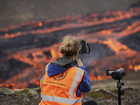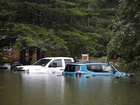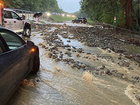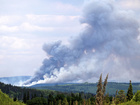As much of the world swelters in record temperatures, spare a thought for Issam Genedi, who ekes out a living washing cars in one of the planet's hottest regions, the Gulf.
Pausing from his work at an outdoor carpark in Dubai, the Egyptian migrant says the United Arab Emirates' furnace-like summer feels even hotter this year.
 Full Story
Full Story
Record global ocean heating has invaded Florida with a vengeance.
Water temperatures in the mid-90s (mid-30s Celsius) are threatening delicate coral reefs, depriving swimmers of cooling dips and adding a bit more ick to the Sunshine State's already oppressive summer weather. Forecasters are warning of temperatures that with humidity will feel like 110 degrees (43 degrees Celsius) by week's end.
 Full Story
Full Story
Protesters and legislators converged on the European Union parliament Tuesday as the bloc prepared a cliffhanger vote on protecting its threatened nature and shielding it from disruptive environmental change, in a test of the EU's global climate credentials.
Spurred on by climate activist Greta Thunberg, a few hundred demonstrators demanded that the EU pushes through a bill to beef up the restoration of nature in the 27-nation bloc that was damaged during decades of industrial expansion. A counterdemonstration of farmers demanded a slower approach that would lessen the impact on their income.
 Full Story
Full Story
Authorities in Iceland on Tuesday warned tourists and other spectators to stay away from a newly erupting volcano that is spewing lava and noxious gases from a fissure in the country's southwest.
The eruption began Monday afternoon after thousands of earthquakes in the area, meteorological authorities said. This one comes 11 months after its last eruption officially ended. The eruption is in an uninhabited valley near the Litli-Hrútur mountain, some 30 kilometers southwest of the capital, Reykjavik.
 Full Story
Full Story
A storm that left up to two months' worth of rain in Vermont and saturated other parts of the Northeast was moving out Tuesday, but more flooding was expected after already cutting off access to some communities, including the main approach to the state capital.
There have been no reports of injuries or deaths related to the Vermont flooding, according to emergency officials. But dozens of roads were closed, including many along the spine of the Green Mountains. And the National Weather Service issued flash flood warnings and advisories for much of the state from the Massachusetts line north to the Canadian border.
 Full Story
Full Story
Temperatures were soaring across Spain on Monday with the mercury set to touch 44 degrees Celsius (111 Fahrenheit) in the south as the country braced for its second heatwave in a fortnight.
 Full Story
Full Story
Torrential rain has been pounding southwestern Japan, triggering floods and mudslides and leaving two people dead and at least six others missing Monday.
Rains falling on the regions of Kyushu and Chugoku since the weekend caused flooding along a number of rivers as well as mudslides, closing roads, disrupting trains and cutting the water supply in some areas.
 Full Story
Full Story
Heavy rain spawned extreme flooding in New York's Hudson Valley that killed at least one person, swamped roadways and forced road closures on Sunday night, as much of the rest of the Northeast U.S. began bracing for potentially punishing rains.
As the storm moved east, the National Weather Service extended flash flood warnings into Connecticut, including the cities of Stamford and Greenwich, before creeping into Massachusetts. Forecasters said some areas could get as much as 5 inches (12 centimeters) of rain.
 Full Story
Full Story
Cities across China opened their air raid shelters to offer residents relief from the heat Friday as unusually high temperatures across parts of the country started claiming lives.
Northern China is experiencing strings of days with record-high temperatures, compounded by drought. Earlier this week, Beijing reported more than nine straight days with temperatures exceeding 35 C (95 F), according to the National Climate Center — a streak unseen since 1961.
 Full Story
Full Story
As a warming Earth simmered into worrisome new territory this week, scientists said the unofficial records being set for average planetary temperature were a clear sign of how pollutants released by humans are warming their environment. But the heat is also just one way the planet is telling us something is gravely wrong, they said.
"Heat sets the pace of our climate in so many ways ... it's never just the heat," said Kim Cobb, a climate scientist at Brown University.
 Full Story
Full Story



